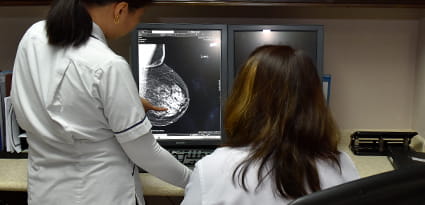
Why Gulf countries need more 'patient champions'
Dr Howard Podolsky is chief executive of Johns Hopkins Aramco Healthcare
Basmah, a patient at my hospital, is a brave lady indeed. We treated her for breast cancer after a mammogram and biopsy confirmed she had the disease. Basmah, a mother of two, went through chemotherapy, a lumpectomy and radiotherapy. I am delighted to say that she made an excellent recovery and is now in remission, Alhamdulillah.
As if beating cancer was not enough, Basmah is now helping us to raise awareness about the importance of breast screening. To this end, a particularly powerful element of Basmah’s story is how her friends reacted when she told them about her mammogram result: They immediately booked screening appointments of their own. As Basmah says: “They told me it was like I turned on a lamp in their brains.”
Breast cancer is the most commonly diagnosed cancer in the GCC countries and has the second-highest mortality rate of all cancers in the region. But detecting breast cancer early gives a patient an almost 99 per cent chance of being cured and reduces the likelihood of death by nearly 40 per cent.
In other words, early detection is key to the successful treatment and long-term survival of breast cancer patients – and the same is true of other cancers and other diseases. However, health care is still catching up with the idea that prevention – in which screening plays a crucial role – is a much better way of caring for people than treating them after they fall ill.
Screening and other forms of preventative medicine allow doctors to catch problems early and nip them in the bud before they turn into something worse – which is great news for patients. On a policy level, preventative health care is preferable to treatment because it reduces the pressure on healthcare systems and costs governments considerably less in the long run.
Health policymakers have long been gearing up for this monumental shift. In Saudi Arabia, for example, disease prevention is a central pillar of the Health Sector Transformation Programme within Vision 2030. Policymakers and healthcare providers across the country are working together on large-scale public health campaigns, community outreach programmes and digital engagement.
These positive actions are to be welcomed. However, the road is a long one. A significant hurdle to overcome is changing people’s attitudes about how health care works, because preventative health care, by its very nature, requires them to be much more proactive about looking after their health.
Patients have a huge role to play here, particularly when it comes to raising awareness about the benefits of screening. This is because the real-life experiences of real people inspire those around them – just as Basmah’s experience inspired her friends to book mammogram appointments.
Experiences such as Basmah’s are charged with a spark of emotion that is all but impossible to convey in a broad-brush awareness campaign. Real experiences and real emotions are very effective at changing attitudes and perceptions, and we would do well to harness them as we seek to raise awareness about the benefits of preventative health.
Patients have a huge role to play here, particularly when it comes to raising awareness about the benefits of screening
This is why patients at my hospital are being encouraged to step forward and become “patient champions” who share their experiences about breast, prostate and colorectal cancer screening with the wider world.
Another crucial element of Basmah’s story is that her experience inspired her to book a breast screening appointment for her mother. Cultivating a pro-screening attitude within the family unit is, I believe, another powerful means of changing attitudes around preventative health care from the ground up.
Medical research spanning multiple disciplines tells us that the health habits of parents have an outsized effect on their children. There is also research showing that children can influence good health habits in their parents. Positive attitudes about health screening can therefore echo from the core to the periphery of the family unit – and beyond.
The Gulf region suffers from an unusually high level of preventable lifestyle-related disease. Unfortunately, the situation is expected to get worse over the coming decade. Rapidly rising levels of obesity and type 2 diabetes are bringing about more cases of cancer, heart disease and other serious, chronic and at times, deadly illnesses. This is already putting a significant strain on healthcare systems.
We can do much to avoid catastrophe by embracing the prevention-first, treatment-second approach. My hope is that the shared experiences of brave people like Basmah will inspire others to appreciate that now is the time to take charge of their health.
